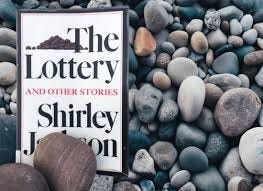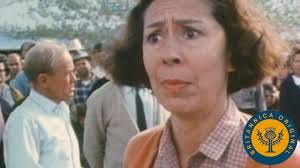I just happened to read Jan Harayda’s thoughtful Substack piece on Shirley Jackson’s classic horror story “The Lottery” this morning — “22 Ways Of Looking At ‘The Lottery’ — (It’s recommended — check it out!) and her story made me think about an experiment I pulled off in my AP Literature and English classes some years ago. An experiment that made me wonder about human nature.
If you’ve been paying attention to what’s going on in our world these days, the President thinking it’s cute to post a picture of himself as The Pope, the son of an NFL coach prank-calling Deion Sanders’ son pretending he was a team drafting him when the kid actually wasn’t drafted until days later — a huge disappointment — people saying and writing the most ugly things online every day, you have to wonder where, as a world, we are right now?
For those of you who have not read “The Lottery” or forgotten it, Jackson’s story takes place in what seems to be a sweet, small town. For some reason, there’s this big event in the center of town that has everybody stirred up. Some people are gathering stones, which seems odd. There just seems to be such a general hullabaloo over this meeting, men, women, children, everybody is there for this big-deal lottery. What’s it all about?
Once we find out what the lottery is — that they are going to randomly select one of the town’s citizens to be stoned to death — well, we are quite rightly horrified.


Jackson’s story appeared in The New Yorker in 1948, just a couple years after we had dropped atomic bombs on two Japanese cities to bring an end to World War II, after we had learned of the Holocaust and some of the other atrocities of the war. That sort of stuff was in the air.
Jackson said she wrote it swiftly, after a trip to the grocery store, in one fell swoop start to finish, unlike the way most writers craft a short story. She submitted it to the New Yorker and according to her, the one change the editors asked was to make the date of the lottery the day the magazine came out.
An article in The New Yorker long after the story appeared gave more information. “I had the idea fairly clearly in my mind when I put my daughter in her playpen and the frozen vegetables in the refrigerator,” Jackson said, “and, writing the story, I found that it went quickly and easily, moving from beginning to end without pause. As a matter of fact, when I read it over later I decided that except for one or two minor corrections, it needed no changes, and the story I finally typed up and sent off to my agent the next day was almost word for word the original draft.”
We read the story in class and, as you might expect, the students were shocked by the story’s awful turn. We discussed it, talked about whether or not people really were like that. Many of the students said we were long past that kind of barbaric behavior, nothing like that would happen now.
We also talked about the impact of the story, explained that when the story hit, it was like a literary atom bomb. The New Yorker wasn’t ready for it. The magazine was just deluged with letters, way more than any other story by any other writer had generated. And in carefully examining the hundreds of letters, author Jackson was horrified.
“People at first were not so much concerned with what the story meant,” she wrote, “what they wanted to know was where these lotteries were held, and whether they could go there and watch.”
Ooooh, the kids said. That’s sick. How could people be like that? We batted it around for a bit, let them think about it. A day later, I invited them to watch the Encylopaedia Brittanica’s video version of the story. They were eager to do so, this story was in their heads.
Having watched the Brittanica version during my lunch period, it gave me an idea. While the film was well done and sticks to the storyline very well, Jackson’s story ends somewhat abruptly…the woman about to be stoned to death speaks out -- “It isn’t fair, it isn’t right…” and then they were upon her.” That’s how it ends. (I.E.: No blood.)
The video, by way of contrast, actually showed the woman backed against the wall, the people moving in, stones in hand. What if, I thought, I stopped the video just before that with no warning, cutting off the would-be stoning? How would they react? Would they be upset?
I let the video play, they saw Mrs. Hutchinson get selected as the lottery “winner” and as the gathering crowd of people of all ages, even little kids, stones in hand, began to move in, I abruptly paused the video.
Immediately, Araceli, a soft-spoken, impeccably polite young lady sitting in front, let out a holler, the only time in three years I’d ever heard her raise her voice.
“MR. NOGO! WHY ARE YOU STOPPING IT?” The class was in an instant uproar.
“AHA!” I said. “So you do want to see the stoning, huh? We’re past this kind of behavior, are we?” The class was in an uproar. We talked about it for a few minutes, then, yeah, I let the video finish.
Is that in all of our nature? Is it an offshoot of us laughing when someone trips and falls? Shirley Jackson’s story, creepy as it is, perhaps made us understand something about our nature, how we’re not where we could be — maybe should be — as humans, as Christians.
They had a three-page writing assignment to talk about what the story — and video — taught them about human nature. When we were done, I shared with them what Shirley Jackson said after reading all the letters, many from people wondering where they could go and watch.
“I have all the letters still,” Jackson wrote, “and if they could be considered to give an accurate cross section of the reading public . . . I would stop writing now.”
HERE’S THE ENCYCLOPAEDIA BRITTANICA VERSION OF “THE LOTTERY”




Very smart of you to stop it there,….. man I bet that made them think!!!
Wow, that sounds like a great class!